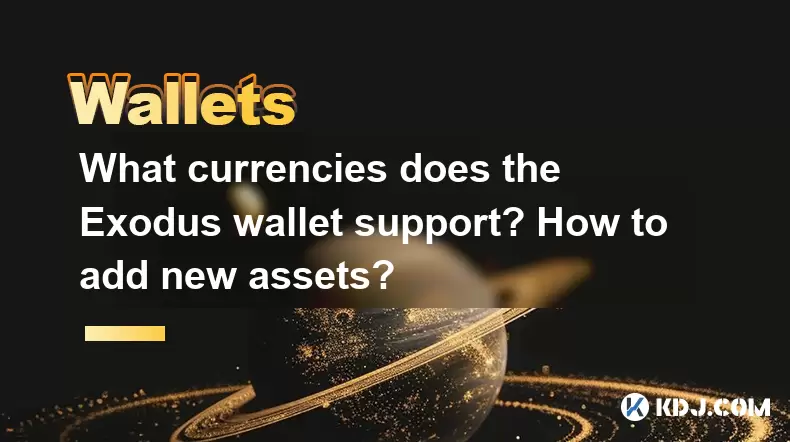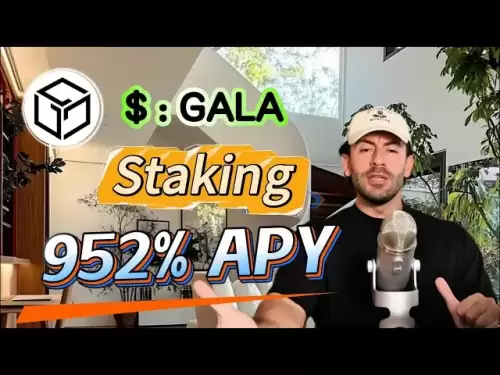-
 Bitcoin
Bitcoin $114500
-0.31% -
 Ethereum
Ethereum $3648
1.11% -
 XRP
XRP $3.033
-0.27% -
 Tether USDt
Tether USDt $0.9999
-0.01% -
 BNB
BNB $758.5
-0.32% -
 Solana
Solana $167.5
1.48% -
 USDC
USDC $0.9998
-0.02% -
 TRON
TRON $0.3331
0.74% -
 Dogecoin
Dogecoin $0.2039
0.25% -
 Cardano
Cardano $0.7419
-0.46% -
 Hyperliquid
Hyperliquid $39.21
2.66% -
 Stellar
Stellar $0.4049
-1.95% -
 Sui
Sui $3.483
-0.56% -
 Bitcoin Cash
Bitcoin Cash $570.8
2.89% -
 Chainlink
Chainlink $16.67
-0.57% -
 Hedera
Hedera $0.2470
-1.57% -
 Ethena USDe
Ethena USDe $1.001
0.00% -
 Avalanche
Avalanche $22.36
1.52% -
 Litecoin
Litecoin $123.4
4.35% -
 UNUS SED LEO
UNUS SED LEO $8.989
0.09% -
 Toncoin
Toncoin $3.324
-2.40% -
 Shiba Inu
Shiba Inu $0.00001219
-1.30% -
 Uniswap
Uniswap $9.811
2.54% -
 Polkadot
Polkadot $3.662
-0.07% -
 Monero
Monero $295.5
-3.85% -
 Dai
Dai $1.000
0.01% -
 Bitget Token
Bitget Token $4.345
0.24% -
 Cronos
Cronos $0.1380
0.95% -
 Pepe
Pepe $0.00001044
-1.14% -
 Ethena
Ethena $0.5981
-4.24%
What currencies does the Exodus wallet support? How to add new assets?
Exodus wallet supports over 260 cryptocurrencies, including BTC, ETH, and LTC, and allows easy addition of new assets through its user-friendly interface.
May 11, 2025 at 04:21 pm

The Exodus wallet is a popular choice among cryptocurrency enthusiasts due to its user-friendly interface and robust support for a wide variety of digital assets. In this article, we will explore the currencies supported by the Exodus wallet and provide a detailed guide on how to add new assets to your wallet.
Overview of Exodus Wallet
Exodus wallet is a multi-currency wallet that allows users to manage various cryptocurrencies in one place. It is available on desktop, mobile, and as a browser extension, making it accessible across different platforms. The wallet is known for its intuitive design and features like built-in exchange and staking, which enhance the user experience.
Currencies Supported by Exodus Wallet
The Exodus wallet supports a wide range of cryptocurrencies, making it a versatile tool for managing your digital assets. As of the latest update, Exodus wallet supports over 260 different cryptocurrencies. Some of the most notable ones include:
- Bitcoin (BTC)
- Ethereum (ETH)
- Litecoin (LTC)
- Ripple (XRP)
- Bitcoin Cash (BCH)
- Cardano (ADA)
- Stellar (XLM)
- Polkadot (DOT)
- Chainlink (LINK)
- Tether (USDT)
This list is not exhaustive, and Exodus regularly updates its supported assets to include new and emerging cryptocurrencies. You can check the full list of supported assets on the official Exodus website.
How to Check Supported Currencies
To check which currencies are supported by the Exodus wallet, follow these steps:
- Open the Exodus wallet on your desktop, mobile device, or browser extension.
- Navigate to the "Assets" tab at the bottom of the screen.
- Scroll through the list to see all the supported cryptocurrencies.
- Use the search function at the top of the "Assets" tab to quickly find a specific cryptocurrency.
Adding New Assets to Exodus Wallet
Adding new assets to your Exodus wallet is a straightforward process. Here’s a detailed guide on how to do it:
- Open the Exodus wallet on your preferred platform.
- Navigate to the "Assets" tab.
- Click on the "+" icon at the top right corner of the "Assets" tab.
- Search for the cryptocurrency you want to add using the search bar.
- Select the cryptocurrency from the list of search results.
- Click on "Add to Wallet" to add the new asset to your portfolio.
Once you have added the new asset, it will appear in your "Assets" tab, and you can start managing it like any other cryptocurrency in your wallet.
Receiving New Assets in Exodus Wallet
After adding a new asset to your Exodus wallet, you will need to receive it into your wallet. Here’s how to do it:
- Navigate to the "Assets" tab and find the newly added cryptocurrency.
- Click on the cryptocurrency to open its detailed view.
- Click on the "Receive" button.
- A unique address for the selected cryptocurrency will be generated. You can copy this address or use the QR code to receive funds.
- Share the address or QR code with the sender to receive the cryptocurrency into your Exodus wallet.
Sending New Assets from Exodus Wallet
Sending new assets from your Exodus wallet is just as easy. Here’s how to do it:
- Navigate to the "Assets" tab and find the cryptocurrency you want to send.
- Click on the cryptocurrency to open its detailed view.
- Click on the "Send" button.
- Enter the recipient's address in the "To" field.
- Enter the amount you want to send in the "Amount" field.
- Review the transaction details and click on "Send" to complete the transaction.
Managing New Assets in Exodus Wallet
Once you have added and received new assets in your Exodus wallet, you can manage them effectively using the wallet’s features. Here are some tips for managing your new assets:
- Monitor your portfolio: Regularly check the "Assets" tab to keep track of your holdings and their performance.
- Use the built-in exchange: If you need to convert one cryptocurrency to another, use the built-in exchange feature to do so directly within the wallet.
- Stake your assets: If the cryptocurrency you added supports staking, you can stake it directly from the Exodus wallet to earn rewards.
- Secure your wallet: Always ensure that your wallet is secured with a strong password and consider enabling two-factor authentication for added security.
Frequently Asked Questions
Q: Can I add custom tokens to the Exodus wallet?
A: Currently, Exodus wallet does not support the addition of custom tokens. You can only add cryptocurrencies that are officially supported by the wallet.
Q: How often does Exodus update its list of supported cryptocurrencies?
A: Exodus regularly updates its list of supported cryptocurrencies. New assets are typically added based on user demand and the overall popularity of the cryptocurrency.
Q: Is there a fee for adding new assets to the Exodus wallet?
A: There is no fee for adding new assets to the Exodus wallet. However, you may incur network fees when sending or receiving the new assets.
Q: Can I use the Exodus wallet to manage my assets on different blockchains?
A: Yes, Exodus wallet supports assets on various blockchains, including Bitcoin, Ethereum, and many others. You can manage all your assets in one place, regardless of the blockchain they are on.
Disclaimer:info@kdj.com
The information provided is not trading advice. kdj.com does not assume any responsibility for any investments made based on the information provided in this article. Cryptocurrencies are highly volatile and it is highly recommended that you invest with caution after thorough research!
If you believe that the content used on this website infringes your copyright, please contact us immediately (info@kdj.com) and we will delete it promptly.
- Uniswap Valuation Under the Microscope: Bitwise CIO's Perspective
- 2025-08-05 23:10:12
- Coinbase's $2 Billion Convertible Notes: A Bold Move or Risky Bet?
- 2025-08-05 23:10:12
- Inveniam, MANTRA, and Real-World Assets: Forging a New DeFi Frontier
- 2025-08-05 22:30:12
- Cyprus Investor's $448K Crypto Loss: An Email Hack Wake-Up Call for Crypto Exchanges
- 2025-08-05 22:30:12
- Solana Memecoin Mania: Trader Profit Secrets Revealed!
- 2025-08-05 20:30:13
- POL Price Rebound: Will Consolidation Lead to a Breakout?
- 2025-08-05 20:30:13
Related knowledge

How to add TRC20 token to Trust Wallet?
Aug 04,2025 at 11:35am
Understanding TRC20 and Trust Wallet CompatibilityTrust Wallet is a widely used cryptocurrency wallet that supports multiple blockchain networks, incl...

What is a watch-only wallet in Trust Wallet?
Aug 02,2025 at 03:36am
Understanding the Concept of a Watch-Only WalletA watch-only wallet in Trust Wallet allows users to monitor a cryptocurrency address without having ac...

Why can't I connect my Trust Wallet to a DApp?
Aug 04,2025 at 12:00pm
Understanding DApp Connectivity and Trust WalletConnecting your Trust Wallet to a decentralized application (DApp) is a common process in the cryptocu...

How to fix a stuck pending transaction in Trust Wallet?
Aug 03,2025 at 06:14am
Understanding Why Transactions Get Stuck in Trust WalletWhen using Trust Wallet, users may occasionally encounter a pending transaction that appears t...

What is a multi-coin wallet in Trust Wallet?
Aug 03,2025 at 04:43am
Understanding Multi-Coin Wallets in Trust WalletA multi-coin wallet in Trust Wallet refers to a digital wallet that supports multiple cryptocurrencies...

How to switch between networks in Trust Wallet?
Aug 02,2025 at 12:36pm
Understanding Network Switching in Trust WalletSwitching between networks in Trust Wallet allows users to manage assets across different blockchains s...

How to add TRC20 token to Trust Wallet?
Aug 04,2025 at 11:35am
Understanding TRC20 and Trust Wallet CompatibilityTrust Wallet is a widely used cryptocurrency wallet that supports multiple blockchain networks, incl...

What is a watch-only wallet in Trust Wallet?
Aug 02,2025 at 03:36am
Understanding the Concept of a Watch-Only WalletA watch-only wallet in Trust Wallet allows users to monitor a cryptocurrency address without having ac...

Why can't I connect my Trust Wallet to a DApp?
Aug 04,2025 at 12:00pm
Understanding DApp Connectivity and Trust WalletConnecting your Trust Wallet to a decentralized application (DApp) is a common process in the cryptocu...

How to fix a stuck pending transaction in Trust Wallet?
Aug 03,2025 at 06:14am
Understanding Why Transactions Get Stuck in Trust WalletWhen using Trust Wallet, users may occasionally encounter a pending transaction that appears t...

What is a multi-coin wallet in Trust Wallet?
Aug 03,2025 at 04:43am
Understanding Multi-Coin Wallets in Trust WalletA multi-coin wallet in Trust Wallet refers to a digital wallet that supports multiple cryptocurrencies...

How to switch between networks in Trust Wallet?
Aug 02,2025 at 12:36pm
Understanding Network Switching in Trust WalletSwitching between networks in Trust Wallet allows users to manage assets across different blockchains s...
See all articles

























































































